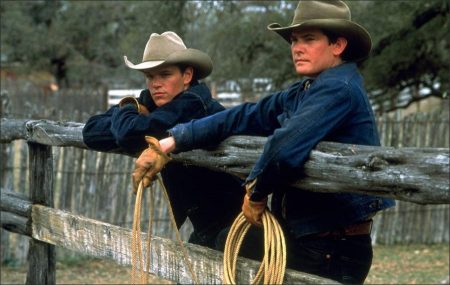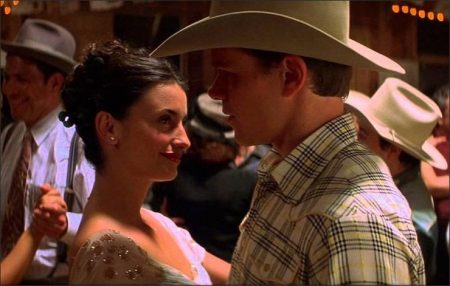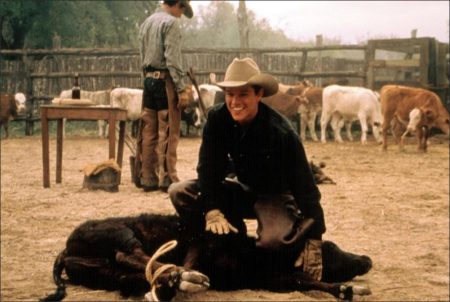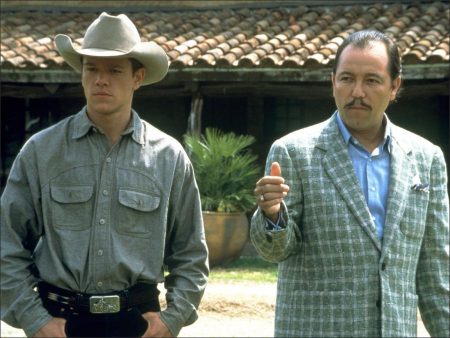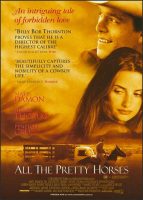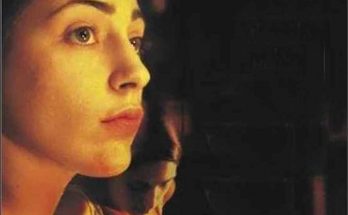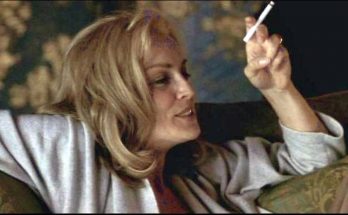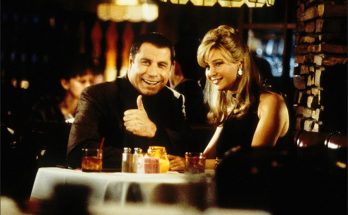All the Pretty Horses Movie Trailer. John Grady Cole, the noble young cowboy played by Matt Damon in ”All the Pretty Horses,” says that life boils down to a simple choice: ”stick or quit.” ”How I was is how I am, and all I know is to stick,” he tells his boon companion, Lacey Rawlins (Henry Thomas).
Billy Bob Thornton and Ted Tally, the director and screenwriter, respectively, of this big, slow, western, have certainly stuck close to their source, Cormac McCarthy’s beloved National Book Award-winning novel of 1992. Virtually all the dialogue in the movie — in Spanish, in twangy cowboyese and in the strangely stilted version of English that seems to be the native idiom of the Mexican ruling class — has been carefully transferred from the pages of the book.
The details of the story of John Grady’s ill-starred romance with a Mexican landowner’s daughter have also been reproduced with respectful care. But the movie, for all its prettiness, manages to be shallow and portentous at the same time. The material to which Mr. Thornton and Mr. Tally have been so ardently faithful has betrayed them. The wiser course may have been to quit.
Mr. McCarthy’s admirers cherish ”All the Pretty Horses,” the first volume in a trilogy that also includes ”The Crossing” and ”Cities of the Plain,” for its manly, lyrical prose and its deep thoughts on the relations between man and nature, man and woman, and man and horse.
The filmmakers have wisely resisted the temptation to incorporate Mr. McCarthy’s high literary style into the picture or to seek out its visual equivalent. Unfortunately, the story, shorn of its philosophical pretensions and fancy writing, turns out to be thin and banal.
”All the Pretty Horses” looks like a real old-fashioned western and tries to revive sturdy horse-opera themes of love, friendship and righteous violence. But in spite of some thoughtful performances and a handsome sense of scale, the picture is, for the most part, as slick and superficial as a Marlboro advertisement on the back of a glossy magazine. It alludes to the mythology of the American West without engaging it and supplies a series of picturesque landscapes and grandiose gestures utterly lacking in narrative momentum or emotional resonance.
Even Barry Markowitz’s gorgeous cinematography and Marty Stuart’s eclectic score work to undermine rather than complement each other. The music, a tasteful blend of mariachi, norteno and western swing (among other things), covers the movie like wall-to-wall carpeting. Once or twice, it would be good to contemplate the vastness of the desert landscape in silence.
In essence ”All the Pretty Horses” is a boy’s adventure story that has mistaken itself for an epic, and it rattles around in its own ambitions like a child’s head in a 10-gallon hat. It’s somewhat fitting, then, that the liveliest and most interesting character should be a child, a stripling named Jimmy Blevins (Lucas Black), who joins Lacey and John Grady on their trek across the Texas border into Mexico.
John Grady has been set adrift by his parents’ divorce and his mother’s inconsiderate sale of the family homestead. Lacey, his best friend, is the designated sidekick, while Blevins, a prepubescent hothead with a foul mouth and a marksman’s eye, has stolen his stepfather’s horse and, like a manic Huck Finn, lit out for the territories.
Mr. Black’s fine performance, with its combination of boisterousness and vulnerability, gives the movie a touch of humor and unpredictability it sorely needs. When Blevins’s mischievous bluster lands him in morally serious trouble, the film finds its only genuine moment of strong feeling.
In contrast, the grand passion that develops between John Grady and Alejandra (Penelope Cruz), whose father owns the hacienda on which the two vagabonds find work, is like an Archie Comics version of ”A Place in the Sun.” The lovers exchange smoldering glances as they pass on horseback, and soon enough Alejandra is sneaking into John Grady’s quarters for a bit of discreet montage.
Alejandra’s disapproving aunt, who seems to have wandered in from an Edith Wharton telenovela, gets wind of the affair and subjects John Grady to a series of lectures in philosophy (”It is not a matter of right, but a matter of who must say”) before shipping him, along with poor Lacey, off to jail.
Ms. Cruz and Mr. Damon are certainly a nice-looking pair, but the film’s treatment of their characters’ relationship is so stylized and detached that no spark of genuine longing ever ignites between them. Poor Ms. Cruz must utter some of the corniest woman-in-love lines this side of ”The Bridges of Madison County,” and, to put it as kindly as possible, she’s no Meryl Streep. Mr. Damon does a bit better, but John Grady’s chivalric goodness smothers the streak of bad-boy spontaneity that is his most appealing trait.
The great westerns of the 1940’s and 50’s were rich with subtext, full of psychosexual implication and political anxiety. ”All the Pretty Horses,” which is set in 1949, strips away such complexity.
Its view of the difference between Texas and Mexico is as schematic as its ideas about men and women. The northern side of the Rio Grande is a place of law and justice, as embodied by a kindly judge (Bruce Dern), who comes to John Grady’s aid at the end. The mysterious land south of the border, on the other hand, is ruled by the arbitrary and corrupt exercise of power, represented by a sinister police captain and that meddling aunt. This would be bothersome, or possibly even interesting, if the movie were not so abstract and complacent, if it had a thought, that is, in its pretty little head.
All the Pretty Horses (2000)
Directed by: Billy Bob Thornton
Starring: Matt Damon, Penélope Cruz, Henry Thomas, Angelina Torres, Laura Poe, Sam Shepard, Robert Patrick, Lucas Black, Miriam Colon, Imelda Colindres, Yvette Diaz
Screenplay by: Ted Tally
Production Design by: Clark Hunter
Cinematography by: Barry Markowitz
Film Editing by: Sally Menke
Costume Design by: Doug Hall
Set Decoration by: Traci Kirshbaum
Art Direction by: Max Biscoe, Richard L. Johnson
Music by: Marty Stuart, Kristin Wilkinson, Larry Paxton
MPAA Rating: PG-13 for violence and some sexuality.
Distributed by: Columbia Pictures
Release Date: December 25, 2000
Views: 557
